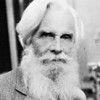What reason, what prudence, is there in wishing to glory in the greatness and extent of the empire, when you cannot point out the happiness of men who are always rolling, with dark fear and cruel lust, in warlike slaughters and in blood, which, whether shed in civil or foreign war, is still human blood; so that their joy may be compared to glass in its fragile splendor, of which one is horribly afraid lest it should be suddenly broken in pieces.
[Quae sit ratio, quae prudentia, cum hominum felicitatem non possis ostendere, semper in bellicis cladibus et in sanguine ciuili uel hostili, tamen humano cum tenebroso timore et cruenta cupiditate uersantium, ut uitrea laetitia comparetur fragiliter splendida, cui timeatur horribilius ne repente frangatur.]
Augustine of Hippo (354-430) Christian church father, philosopher, saint [b. Aurelius Augustinus]
City of God [De Civitate Dei], Book 4, ch. 3 (4.3) (AD 412-416) [tr. Dods (1871)]
(Source)
(Source (Latin)). Alternate translations:
You cannot show such estates to be anyway happy, as are in continual wars, and constantly in terror, trouble, and guilt of shedding human blood, though it be their foes’; with what reason or wisdom any man doth wish to glory in the largeness of empire, since all their joy is but as a glass, bright and brittle, and evermore in fear and danger of breaking.
[tr. Healey (1610)]
Is it reasonable and wise to glory in the extent and greatness of the Empire when you can in no way prove that there is any real happiness in men perpetually living amid the horrors of war, perpetually wading in blood? Does it matter whether it is the blood of their fellow citizens or the blood of their enemies? It is still human blood, in men perpetually haunted by the gloomy spectre of fear and driven by murderous passions. The happiness arising from such conditions is a thing of glass, of mere glittering brittleness. One can never shake off the horrible dread that it may suddenly shiver into fragments.
[tr. Zema/Walsh (1950)]
You cannot show that men are happy who live always amid the disasters of war. It matters not whether the blood shed is that of fellow-citizens or of enemies; in any case it is the blood of men. The dark shadow of fear and the lust for blood are always with them. Any joy that they know is like the glitter of brittle glass, which inspires the frightful thought that it may suddenly be shattered.
[tr. Green (Loeb) (1963)]
Is it reasonable, is it sensible, to boast of the extent and grandeur of empire, when you cannot show that men lived in happiness, as they passed their lives amid the horrors of war, amid the shedding of men's blood -- whether the blood of enemies or fellow-citizens -- under the shadow of fear and amid the terror of ruthless ambition? The only joy to be attained had the fragile brilliance of glass, a joy outweighed by the fear that it may be shattered in a moment.
[tr. Bettenson (1972)]
Is it wise or prudent to wish to glory in the breadth and magnitude of an empire when you cannot show that the men whose empire it is are happy? For the Romans always lived in dark fear and cruel lust, surrounded by the disasters of war and the shedding of blood which, whether that of fellow citizens or enemies, was human nonetheless. The joy of such men may be compared to the fragile splendour of glass: they are horribly afraid lest it be suddenly shattered.
[tr. Dyson (1998)]
What reason or sense is there in wanting to boast of the size and expanse of an empire when you cannot show that its people are happy? Or why boast of an empire if its people always dwell in the midst of the disasters of war and the spilling of blood -- the blood of fellow-citizens or the blood of foreign enemies, but, in either case, human blood -- and always live under the dark shadow of fear and in the lust for blood? Any joy they have may be compared to the fragile brilliance of glass: there is always the terrible fear that it will suddenly be shattered.
[tr. Babcock (2012)]
Quotations about:
bloodshed
Note not all quotations have been tagged, so Search may find additional quotes on this topic.
But it was much earlier even than that when most people forgot that the very oldest stories are, sooner or later, about blood. Later on they took the blood out to make the stories more acceptable to children, or at least to the people who had to read them to children rather than the children themselves (who, on the whole, are quite keen on blood provided it’s being shed by the deserving), and then wondered where the stories went.
MACBETH: It will have blood, they say; blood will have blood.
William Shakespeare (1564-1616) English dramatist and poet
Macbeth, Act 3, sc. 4, l. 152 (3.4.152) (1606)
(Source)
To Lady Macbeth.
Kind-hearted people might of course think there was some ingenious way to disarm or defeat the enemy without too much bloodshed, and might imagine this is the true goal of the art of war. Pleasant as it sounds, it is a fallacy that must be exposed: War is such a dangerous business that mistakes that come from kindness are the very worst.
[Nun könnten menschenfreundliche Seelen sich leicht denken, es gebe ein künstliches Entwaffnen oder Niederwerfen des Gegners, ohne zuviel Wunden zu verursachen, und das sei die wahre Tendenz der Kriegskunst. Wie gut sich das auch ausnimmt, so muß man doch diesen Irrtum zerstören, denn in so gefährlichen Dingen, wie der Krieg eins ist, sind die Irrtümer, welche aus Gutmütigkeit entstehen, gerade die schlimmsten.]
Karl von Clausewitz (1780-1831) Prussian soldier, historian, military theorist
On War [Vom Kriege], Book 1, ch. 1 “What Is War? [Was ist der Krieg?],” § 3 (1.1.3) (1832) [tr. Howard & Paret (1976)]
(Source)
(Source (German)). Alternate translations:
Now, philanthropists may easily imagine there is a skilful method of disarming and overcoming an enemy without causing great bloodshed, and that this is the proper tendency of the art of War. However plausible this may appear, still it is an error which must be extirpated; for in such dangerous things as war, the errors which proceed from a spirit of benevolence are just the worst.
[tr. Graham (1873)]
Now philanthropic souls might easily imagine that there was an artistic way of disarming or overthrowing our adversary without too much bloodshed and that this was what the art of war should seek to achieve. However agreeable this may sound, it is a false idea which must be demolished. In affairs so dangerous as war, false ideas proceeding from kindness of heart are precisely the worst.
[tr. Jolles (1943)]
Wars, horrendous wars,
and the Tiber foaming with tides of blood, I see it all![Bella, horrida bella,
Et Thybrim multo spumantem sanguine cerno.]Virgil (70-19 BC) Roman poet [b. Publius Vergilius Maro; also Vergil]
The Aeneid [Ænē̆is], Book 6, l. 86ff (6.86-87) [The Sybil] (29-19 BC) [tr. Fagles (2006)]
(Source)
(Source (Latin)). Alternate translations:
Wars, horrid wars I see,
And Tyber swell'd with blood.
[tr. Ogilby (1649)]
Wars, horrid wars, I view -- a field of blood,
And Tiber rolling with a purple flood.
[tr. Dryden (1697)]
Wars, horrid wars, I foresee, and Tiber foaming with a deluge of blood.
[tr. Davidson/Buckley (1854)]
War, dreadful war, and Tiber flood
I see incarnadined with blood.
[tr. Conington (1866)]
Dreadful war,
And Tiber frothed with blood, I see from far.
[tr. Cranch (1872), ll. 111-12]
Wars, grim wars I discern, and Tiber afoam with streams of blood.
[tr. Mackail (1885)]
Lo, war, war, dreadful war!
And Tiber bearing plenteous blood upon his foaming back.
[tr. Morris (1900)]
Woes in store,
Wars, savage wars, I see, and Tiber foam with gore.
[tr. Taylor (1907), st. 13, ll. 116-17]
War, red war!
And Tiber stained with bloody foam I see.
[tr. Williams (1910)]
Wars, grim wars I see, and Tiber foaming with streams of blood.
[tr. Fairclough (1916)]
War, I see,
Terrible war, and the river Tiber foaming
With streams of blood.
[tr. Humphries (1951)]
Wars, dreadful wars
I see, and Tiber foaming with torrents of human blood.
[tr. Day-Lewis (1952)]
I see wars, horrid wars, the Tiber foaming
with much blood.
[tr. Mandelbaum (1971), ll. 122-23]
Wars, vicious wars
I see ahead, and Tiber foaming blood.
[tr. Fitzgerald (1981), ll. 132-33]
I see wars, deadly wars, I see the Thybris foaming with torrents of blood.
[tr. West (1990)]
War, fierce war,
I see: and the Tiber foaming with much blood.
[tr. Kline (2002)]
War, I see horrible war, and the Tiber
Foaming with blood.
[tr. Lombardo (2005)]
I see brutal wars and bloody torrents frothing in the Tiber.
[tr. Bartsch (2021)]
Too many wars are fought almost as if by rote. Too many wars are fought out of sloganry, out of battle hymns, out of aged, musty appeals to patriotism that went out with knighthood and moats. Love your country because it is eminently worthy of your affection. Respect it because it deserves your respect. Be loyal to it because it cannot survive without your loyalty. But do not accept the shedding of blood as a natural function or a prescribed way of history, even if history points this up by its repetition. That men die for causes does not necessarily sanctify that cause. And that men are maimed and torn to pieces every fifteen and twenty years does not immortalize or deify the act of war.
Rod Serling (1924-1975) American screenwriter, playwright, television producer, narrator
Commencement Address, Binghamton Central High School, Binghamton, New York (28 Jan 1968)
(Source)
The greatest bloodshed? The most murders? I would say two things: sincere love and a sincere devotion to liberty. … If you kill out of love or for the perfect utopia, you never stop killing because human nature is always imperfect.
Peter Viereck (1916-2006) American poet, historian, academic
“Clio is No Cleo: The Messiness of History,” lecture, Mt. Holyoke College (1997)
(Source)
Reprinted in Society (Mar 2004) and collected in Strict Wildness (2008).
There’s no such thing as life without bloodshed. I think the notion that the species can be improved in some way, that everyone could live in harmony, is a really dangerous idea. Those who are afflicted with this notion are the first ones to give up their souls, their freedom. Your desire that it be that way will enslave you and make your life vacuous.
Cormac McCarthy (1933-2023) American novelist, playwright, screenwriter
In Richard B. Woodward, “Cormac McCarthy’s Venomous Fiction,” New York Times (19 Apr 1992)
(Source)
Maybe we should always show pictures. Bin Laden, pictures of our wounded service people, pictures of maimed innocent civilians. We can only make decisions about war if we see what war actually is — and not as a video game where bodies quickly disappear, leaving behind a shiny gold coin.
All civilization has from time to time become a thin crust over a volcano of revolution.
Havelock Ellis (1859-1939) British sexologist, physician, social reformer [Henry Havelock Ellis]
“The Individual and the Race,” Little Essays of Love and Virtue (1922)
(Source)
In a passage describing the cost of population growth under the Biblical commandment of "Be ye fruitful and multiply." The above is only a fraction of the sentence, which reads in full:
It has meant that all civilisation has from time to time become a thin crust over a volcano of revolution, and the human race has gone on lightly dancing there, striving to forget that ancient warning from a soul of things even deeper than the voice of Jehovah: "At the hand of man will I require the life of man."










